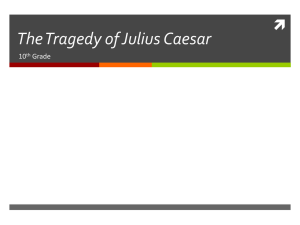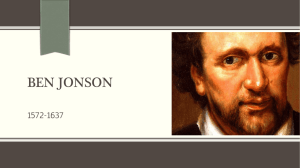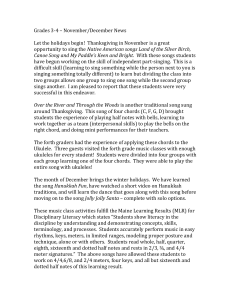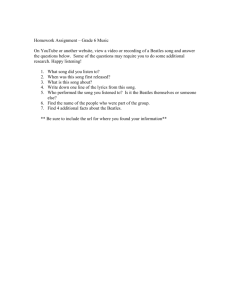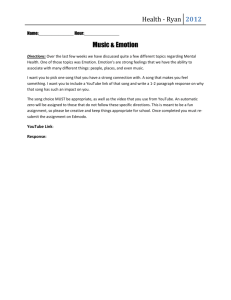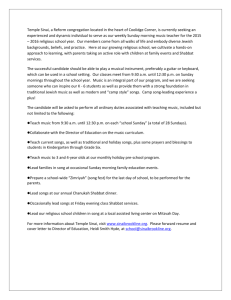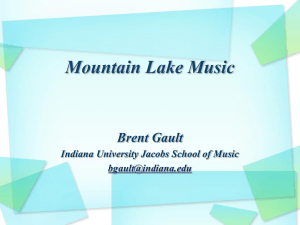Early Modern English Musical Theater
advertisement
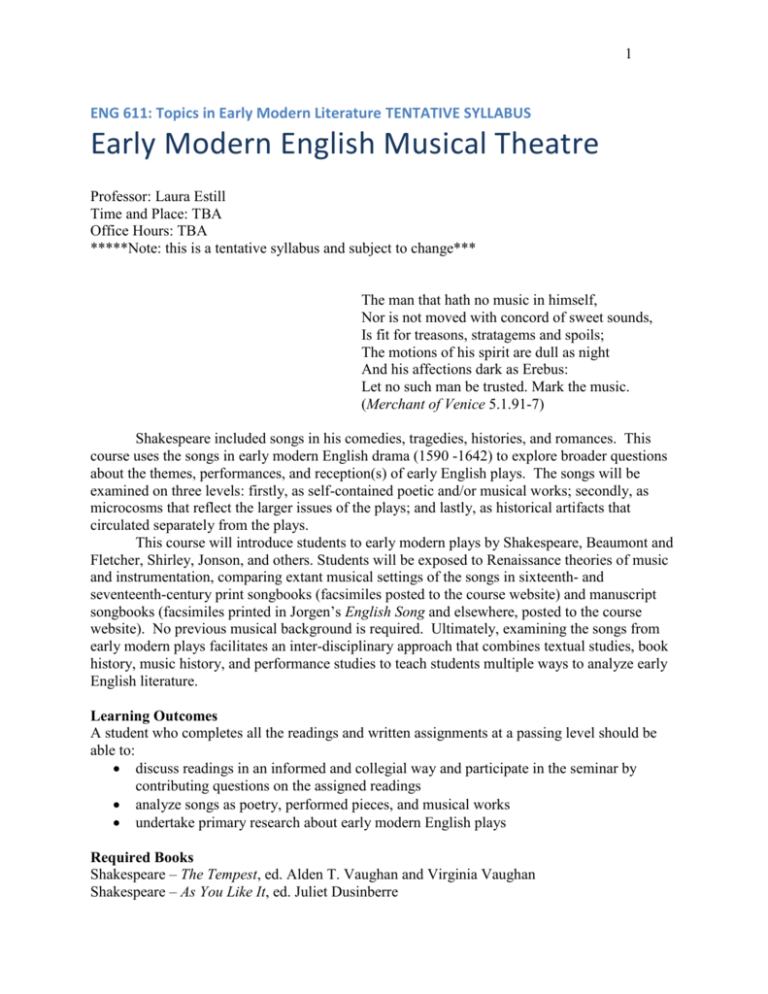
1 ENG 611: Topics in Early Modern Literature TENTATIVE SYLLABUS Early Modern English Musical Theatre Professor: Laura Estill Time and Place: TBA Office Hours: TBA *****Note: this is a tentative syllabus and subject to change*** The man that hath no music in himself, Nor is not moved with concord of sweet sounds, Is fit for treasons, stratagems and spoils; The motions of his spirit are dull as night And his affections dark as Erebus: Let no such man be trusted. Mark the music. (Merchant of Venice 5.1.91-7) Shakespeare included songs in his comedies, tragedies, histories, and romances. This course uses the songs in early modern English drama (1590 -1642) to explore broader questions about the themes, performances, and reception(s) of early English plays. The songs will be examined on three levels: firstly, as self-contained poetic and/or musical works; secondly, as microcosms that reflect the larger issues of the plays; and lastly, as historical artifacts that circulated separately from the plays. This course will introduce students to early modern plays by Shakespeare, Beaumont and Fletcher, Shirley, Jonson, and others. Students will be exposed to Renaissance theories of music and instrumentation, comparing extant musical settings of the songs in sixteenth- and seventeenth-century print songbooks (facsimiles posted to the course website) and manuscript songbooks (facsimiles printed in Jorgen’s English Song and elsewhere, posted to the course website). No previous musical background is required. Ultimately, examining the songs from early modern plays facilitates an inter-disciplinary approach that combines textual studies, book history, music history, and performance studies to teach students multiple ways to analyze early English literature. Learning Outcomes A student who completes all the readings and written assignments at a passing level should be able to: discuss readings in an informed and collegial way and participate in the seminar by contributing questions on the assigned readings analyze songs as poetry, performed pieces, and musical works undertake primary research about early modern English plays Required Books Shakespeare – The Tempest, ed. Alden T. Vaughan and Virginia Vaughan Shakespeare – As You Like It, ed. Juliet Dusinberre 2 Note: other scholarly editions of Shakespeare’s plays are acceptable. If you are unsure if your edition is scholarly, please bring it to class or to my office hours to ask. Coursepack Beaumont – The Knight of the Burning Pestle, ed. Arthur F. Kinney Fletcher, Massinger, Jonson, Chapman – Rollo, Duke of Normandy ed. Fredson Bowers Jonson – Epicoene, ed. David Bevington Middleton – The Widow, ed. Gary Taylor Note: All other readings will be provided via the course website. Recommended Books MLA Handbook for Writers of Research Papers, 7th ed, ed. Joseph Gibaldi. Revising Prose (any edition), by Richard Lanham Schedule Note on the readings. For each play, it will always be valuable to read the introductory material. Week 1: Introduction to the course and each other In-class work with Twelfth Night Week 2: The Knight of the Burning Pestle Lindsey, “The Original Music for Beaumont’s Play The Knight of the Burning Pestle” Wong, “A Dramaturgical Study of Merrythought’s Songs in The Knight of the Burning Pestle” Week 3: early modern music books and instructions Wilson, Select Ayres and Dialogues (1659) Este, Madrigales to 3 4 and 5 parts (1604) Playford, An Introduction to the Skill of Musick (1674) Forscher Weiss, “Didactic Sources of Muiscal Learning in Early Modern England” Selected broadside ballads Week 4: Epicoene From Chan, Music in the Theatre of Ben Jonson From Jonson, The Forest Reflection 1 due Week 5: Rollo, Duke of Normandy Facsimile of part of BL Add. MS 11608 (in Jorgens) Facsimile of Bodleian MS Mus. b. 1 (in Jorgens) Seng on “Take o take those lips away” Richmond, “Take, Oh Take Those Lips Away” Setting from Musique de la Troupe de Shakespeare 3 Week 6: AVPA-oriented class, content will vary based on available performances Week 7: As You Like It Listen: Barenaked Ladies’ As You Like It Listen: Kenneth Branagh’s As You Like It Long on As You Like It Seng on As You Like It Performance Response 1 due Week 8: The Widow Facsimile of part of BL Add. MS 10309 Facsimile of part of BL Add. MS 29396 Estill, “All the Adulteries of Art” Setting from Musique de la Troupe de Shakespeare Reflection 2 due Week 9: Special Collections visit Exploring the early modern musicals in our special collections, with particular attention to Shakespeare’s 1632 second folio, the Theobald and Pope edition, and Jonson’s 1640 Works. Before class, please look at the facsimiles posted on the course website. Week 10: The Contention Between Ajax and Ulysses Adopt-A-Source Lighting Presentations: Adopt-a-Source Adopt-A-Source paper due Week 12: AVPA-oriented class, content will vary based on available performances Week 13: Shakespeare’s The Tempest Facsimile of part of BL Egerton 2421 Neill, “‘Noises, / Sounds and Sweet Airs: The Burden of Shakespeare’s Tempest” Muller, “Music as Meaning in The Tempest” Iselin, “‘My Music for Nothing’: Musical Negotiations in The Tempest” Settings from Musique de la Troupe de Shakespeare Response 2 due Week 14: Dryden and Davenant’s The Tempest Score: Purcell, The Tempest (print and audio) Hooker, “Dryden’s and Shadwell’s Tempest” Reflection 3 due Exam time: final paper due 4 Assignments Performance Responses – 25% Short Reflections – 15% Adopt-a-Source – 20% Final Paper – 40% Performance Responses (2 responses worth 12.5% each) These responses (900-1200 words) will reflect on the AVPA performances that we have attended in relation to our other readings to date. These Short Reflections (3 reflections worth 5% each) These short reflections (400-600 words) should present a short argument about one of the primary texts that we have read this semester. Reflection 1 will analyze a text from weeks 1-4; Reflection 2 will analyze a text from weeks 5, 7, or 8; Reflection 3 will analyze a text from weeks 9, 13, or 14. Final Paper (1 paper worth 40%) Detailed final paper guidelines will be given in class. This will be a 10 page final paper that would be suitable to present at a conference. Adopt-A-Source Presentation and Paper (20%) For our class on The Contention of Ajax and Ulysses (week 10), each person will adopt one source that includes Shirley’s popular song, “The Glories of our Birth and State.” Sources for adoption (continued on next page): BL Add. MS 18220 Lambeth Palace MS 1041* University of Leeds Brotherton MS Lt 54 University of Leeds Brotherton MS Lt 55 Folger MS V.a.232 University of Texas at Austin MS Killigrew T/Misc./B. ** Lawes, The Treasury of Musick (1669) The New Academy of Complements (1669) Synopsis of Vocal Musick Containing the Rudiments of Singing rightly any harmonical song (by Philo-Mus, 1680) Radcliffe, Ovid Travestie, a burlesque upon Ovid’s Epistles (1681) Delights for the ingenious (1684) Pennyman, Multum in parvo (1687) Shadwell, The Scowrers, a Comedy (1691) Wits Academy (1701) New Helpe to Discourse (1702) Miscellanea Sacra (1707) 5 Posthumous works in prose and verse, written in the time of the civil wars and reign of K. Charles II by Mr. Samuel Butler (1715) Reynolds, The Garden of Love (1720) Sepulchorum Inscriptiones: Or a curious collection of above 900 of the most remarkable epitaphs (1727) The British Muse (1738) A Select Collection of English Songs (1783) Paddy Whack’s Bottle Companion (1791) Score: The Glories of Our Birth and State C. H. H. Parry (via archive.org)—please don’t choose this one unless you are comfortable reading music Plumptre, Montgomery, or scenes in Wales (1796) Aikin, Poetry for Children (1806, available from archive.org) Mackay, Songs of England (1857) G. K. Chesterton, “Our Dance of Death” May 18, 1935 broadside ballad copies (“The vanity of vain glory,” EEBO; Percy’s Reliques via ECCO) Unless otherwise noted, sources can be found in the following databases accessible through the library website: British Literary Manuscripts Online 17th and 18th Century Poetry from the Brotherton Library, University of Leeds Perdita Manuscripts Early English Books Online Eighteenth-Century Collections Online for post-1800 sources, try The Internet Archive, Google Books, or the library *Lambeth Palace MS 1041 is in the Jorgens series of facsimiles English Song 1600-1675 ** The U of T MS is in Austin. You can order the dissertation by Cutbirth about it or go visit it in person. Adopt-a-Source Presentation: Each person will do a lightning presentation (5 mins) describing their source. This presentation should explain what the source is, why the song appears, how the song is treated. You should also consider: does the meaning of the song change from its appearance in the original play? does the song reflect any themes in the larger works? how is the song recontextualized? how would a reader or listener approach the song differently in this source? Adopt-a-Source Paper You will write up a short analysis that compares the effect of the song in Shirley’s Contention to your source. An effective response will combine close-reading of the song, an understanding of the play and its themes, and a grasp of the song’s new contexts. Analyzing the song’s new contexts will involve research about your source. This short paper will be 1200-1500 words long. 6 Further material to be provided on Syllabus: grading policy attendance policy late assignment policy assignment formatting policy academic integrity Americans with Disabilities Act information writing center and student success center information Further material to be provided on the course website: list of local performances MLA style guide Hacker’s Writing About Literature bibliography of further sources and links to selected further sources links to appropriate online sources for research
